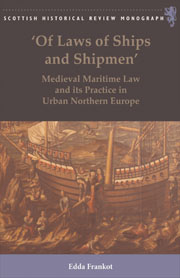Book contents
- Frontmatter
- Contents
- Tables and Maps
- Abbreviations
- Acknowledgements
- Preface
- Introduction
- 1 A History of Maritime Law in Northern Europe
- 2 Shipwreck, Jettison and Ship Collision in Maritime Law
- 3 The Five Towns Introduced
- 4 Written Law: Urban Collections of Sea Law
- 5 Written Law: Local Developments in Lawmaking
- 6 Legal Practice: the Administration of Maritime Justice
- 7 Legal Practice: Maritime Proceedings at the Urban Courts
- Final Conclusions
- Bibliography
- Index
3 - The Five Towns Introduced
Published online by Cambridge University Press: 05 August 2013
- Frontmatter
- Contents
- Tables and Maps
- Abbreviations
- Acknowledgements
- Preface
- Introduction
- 1 A History of Maritime Law in Northern Europe
- 2 Shipwreck, Jettison and Ship Collision in Maritime Law
- 3 The Five Towns Introduced
- 4 Written Law: Urban Collections of Sea Law
- 5 Written Law: Local Developments in Lawmaking
- 6 Legal Practice: the Administration of Maritime Justice
- 7 Legal Practice: Maritime Proceedings at the Urban Courts
- Final Conclusions
- Bibliography
- Index
Summary
Now that it has been established that neither a single written law compilation was available, nor that common regulations regarding the discussed subjects were valid throughout northern Europe during the later Middle Ages, it is time to determine whether any communality can be found in legal practice at the urban courts. Questions such as which written laws were available in the courts; whether any influence of other compilations on the contents of the written laws can be established; whether the written laws were used for the administration of justice; and what the content was of the judgements passed by the courts will be answered in Chapters 4 to 7 as regards the five towns selected for particular study (Aberdeen, Kampen, Lübeck, Reval and Danzig). In this chapter these towns will first be introduced and then compared.
Aberdeen
Aberdeen was the only one of the five towns considered in this study that was an integral part of a single state throughout its medieval history: the kingdom of Scotland. This does not mean that this status was uncontested throughout its history. English kings in the late thirteenth and fourteenth centuries repeatedly tried to annex Scotland to their kingship. Moreover, the medieval Scottish kings never ruled a fully centralised kingdom. The territory was too vast and inhospitable for effective control in all corners of the land. Despite the existence of several burghs, Scotland remained essentially a rural society throughout the Middle Ages.
- Type
- Chapter
- Information
- Of Laws of Ships and ShipmenMedieval Maritime Law and its Practice in Urban Northern Europe, pp. 53 - 80Publisher: Edinburgh University PressPrint publication year: 2012



